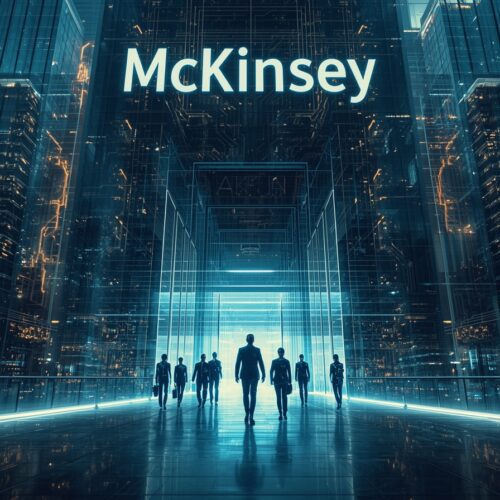We Called It: 2025 Is the Year of AI Agents
(And McKinsey Just Proved Us Right)
Or: How the World’s Most Prestigious Consulting Firm Just Validated Everything We’ve Been Building at AI Compass
Remember when everyone thought we were getting ahead of ourselves calling 2025 “the Year of AI Agents”? Yeah, about that…
McKinsey & Company (one of the world’s most prestigious consulting firms) just went all-in on AI agents. And by “all-in,” I mean they’ve deployed 12,000 AI agents, cut their workforce from 45,000 to 40,000, and fundamentally restructured how they deliver value to clients.
If that doesn’t validate what we’ve been saying at AI Compass, I don’t know what does.
The Consulting Giant Bets Its Future on AI Agents
Here’s what McKinsey’s transformation looks like in practice:
The old model: A typical project required a manager plus 14 consultants working together to deliver strategic insights.
The new model: 2-3 human consultants working alongside multiple AI agents, supported by McKinsey’s internal AI platform “Lilli.”
Think about that for a second. They didn’t just “add some AI tools.” They fundamentally restructured their entire business model around agentic systems (exactly the kind of AI solutions we’ve been building for clients across Australia).
Kate Smaje, McKinsey’s senior partner leading their AI efforts, put it bluntly: “Do I think that this is existential for our profession? Yes, I do. But I think it’s an existential good for us.”
That’s not corporate speak. That’s a company facing reality and adapting fast.
What Makes AI Agents Different?
You’ve probably heard plenty about AI chatbots and assistants. AI agents are something else entirely.
McKinsey’s AI agents don’t just answer questions. They:
- Draft complete PowerPoint presentations
- Take and summarize meeting notes
- Double-check consultants’ logic and reasoning
- Ensure writing maintains McKinsey’s signature style
- Handle tax advisory and research functions autonomously
The key difference? Agency. These systems can plan, reason, and execute complex tasks with minimal human oversight. They don’t wait for prompts. They proactively work toward defined outcomes.
Sound familiar? It’s exactly what we’ve been building for financial services firms, dental practices, and other businesses on the Sunshine Coast and beyond.
The Financial Services Sector Is Moving Fast
While McKinsey’s transformation is grabbing headlines, the financial services industry has been quietly racing ahead with AI agents. Recent developments just from October 2025 alone tell the story:
Accenture invested in Lyzr (October 29) to bring agentic AI specifically to banking, insurance and financial services companies. Their platform enables firms to build secure, compliant AI agents that automate everything from customer support to claims processing and policy renewals.
GoodData launched finance-focused AI applications (October 28) combining their AI Lake, AI Hub, and AI Apps into a single platform for building and deploying AI agents in financial institutions. These agents detect fraud in seconds, maintain compliance in real-time, and handle regulatory reporting with complete audit trails.
SoundHound AI released research (October 27) showing that 70% of banking executives believe agentic AI will have a “significant impact” or be a “game changer” for the industry. Even more telling: 64% of larger banks are already testing or actively deploying agentic AI.
Snowflake announced Cortex AI for Financial Services (October 3) with their Model Context Protocol Server, enabling financial institutions to connect proprietary data with AI agent platforms including Anthropic, CrewAI, and Salesforce’s Agentforce.
This isn’t experimentation anymore. This is production deployment at scale.
The Numbers Tell The Story
The momentum behind AI agents in financial services is staggering:
- 77% of financial services executives report achieving positive ROI from generative AI within the first year (Google Cloud research, September 2025)
- 53% of financial services organisations are actively using AI agents in production, with 40% having already launched more than ten agents
- The AI agents market in financial services is expected to grow by 815% between 2025 and 2030 (Workday, September 2025)
- Banks investing in AI see 3.5x higher revenue growth than non-adopters
One financial services VP revealed their organisation already has 60 agentic agents in production, with plans to deploy an additional 200 agents by 2026.
These aren’t pilot programs. These are production systems handling real customer interactions and business processes.
Why Financial Services? Why Now?
Financial services is particularly well-suited for AI agents because the sector deals with:
- High-volume, repetitive processes (document verification, compliance checks, transaction processing)
- Strict regulatory requirements (where consistency and audit trails are critical)
- 24/7 operational needs (where AI never sleeps)
- Complex decision-making (where AI can analyse hundreds of variables instantly)
Virgin Money built an AI agent called “Redi” that triages customer inquiries, executes predefined journeys, and seamlessly escalates sensitive exceptions to human agents. It’s the perfect example of human-AI collaboration—AI handles the bulk of execution while humans retain control over edge cases.
Capital One introduced Chat Concierge, a multi-agent system that comprehensively addresses customer inquiries related to car purchases. BlackRock established a federated development model where different teams work on AI agents independently while building on a standard foundation.
This is the playbook emerging across the sector.
McKinsey’s Business Model Revolution
Beyond workforce changes, McKinsey has fundamentally restructured how it prices and delivers value:
- 25% of projects now operate on outcome-based pricing. Fees tied to results, not hours billed
- 40% of McKinsey’s estimated $16 billion revenue now comes from AI and technology advisory
- Over 72% of McKinsey professionals use their Lilli AI platform monthly, generating more than 500,000 prompts and saving approximately 50,000 consulting hours each month
Bob Sternfels, McKinsey’s global managing partner, envisions “one AI agent for every human employee.” That’s not a distant vision of the future. That’s their current roadmap.
The consulting industry’s traditional pyramid model, which leverages armies of junior analysts for research and synthesis, is becoming obsolete. AI eliminates the need for those foundational roles, forcing firms to rethink everything from hiring to career progression.
What This Means for Australian Businesses
Here’s the thing: if McKinsey (a firm with over 100 years of consulting expertise and relationships with the world’s largest corporations) needs to go all-in on AI agents to stay relevant, what does that mean for your business?
The good news? You don’t need 12,000 AI agents to transform your operations.
At AI Compass, we’ve been developing practical, outcome-focused AI agent solutions for businesses on the Sunshine Coast and across Australia. Our approach isn’t about replacing humans. It’s about augmenting capabilities and freeing your team to focus on high-value work that requires human judgment, creativity, and relationship skills.
For financial advisors, we’re developing AI agents that handle meeting preparation, note-taking, and follow-ups, allowing you to focus on client relationships and complex planning decisions.
For accountants and tax professionals, AI agents can handle document processing, compliance checks, and routine inquiries while you concentrate on strategic advisory work.
For banking and insurance operations, AI agents automate customer support, claims processing, and policy management, while your team handles nuanced situations that require human empathy and judgment.

The Human Edge Remains Critical (And the Deloitte Lesson)
McKinsey’s transformation isn’t about eliminating humans. It’s about redefining their role. As Sternfels puts it, consultants of tomorrow must “learn faster than ever before” and collaborate seamlessly with both humans and AI agents.
But here’s a critical reality check from our own backyard: human oversight isn’t optional.
In October 2025, Deloitte Australia got caught in an embarrassing scandal that perfectly illustrates why AI agents without proper human oversight can be dangerous. The firm was forced to partially refund the Australian government $440,000 for a 237-page report that was riddled with AI hallucinations.
The issues? Fabricated academic references. Non-existent books and papers. Made-up quotes attributed to a Federal Court judge (with the judge’s name misspelled, no less). References to fictitious case law.
Dr Chris Rudge from Sydney University spotted the errors immediately. As he put it: “I instantaneously knew it was either hallucinated by AI or the world’s best kept secret because I’d never heard of the book and it sounded preposterous.”
The kicker? Deloitte initially didn’t disclose that they’d used Azure OpenAI GPT-4o to generate parts of the report. Only after getting caught did they add a footnote admitting AI use.
Senator Deborah O’Neill summed it up perfectly: “Deloitte has a human intelligence problem. This would be laughable if it weren’t so lamentable.”
This isn’t just about one firm’s mistake. It’s a stark reminder that AI agents (no matter how sophisticated) still generate plausible-sounding nonsense. Without rigorous human oversight, those hallucinations make it into official government reports, court filings, and business decisions.
The lesson for Australian businesses? AI agents are potent tools, but they require:
- Human verification of outputs (especially anything involving facts, citations, or legal/regulatory compliance)
- Clear disclosure when AI is used in professional work
- Defined boundaries for what AI can and cannot do autonomously
- Quality control processes that catch hallucinations before they cause damage
Virgin Money’s “Redi” agent got it right: AI handles the bulk of execution, but humans retain control over edge cases and critical decisions. That’s the model that works.
The human edge increasingly lies in:
- Leadership and strategic thinking
- Persuasion and stakeholder management
- Navigating organisational politics
- Creative problem-solving for novel situations
- Building trust and managing relationships
- Catching AI hallucinations before they become expensive embarrassments
These are capabilities that currently exceed the capabilities of AI systems. However, here’s the catch: if you’re not building AI agent capabilities alongside developing these human strengths, you’ll fall behind quickly.
From Hype to Reality
Look, we’ve all been through enough AI hype cycles to be sceptical. Remember when blockchain was going to revolutionise everything? Or when the metaverse was supposedly the future of business?
But here’s what’s different about AI agents in 2025:
- The technology actually works at a production scale
- Major enterprises are deploying it (not just talking about it)
- The ROI is measurable (77% positive ROI in the first year)
- The use cases are practical (not theoretical)
McKinsey’s transformation isn’t a marketing stunt. Accenture’s investment in Lyzr isn’t speculative. Google’s research, showing that 53% of financial services firms use AI agents in production, isn’t hype.
This is happening. Right now. The gap between early adopters and laggards is widening rapidly.

What We’re Seeing on the Silicon Coast
From our base here on the Sunshine Coast (yes, we’re still pushing the “Silicon Coast” narrative and we’re not apologizing for it), we’re seeing Australian businesses at different stages of this journey:
The leaders: Already deploying AI agents for specific use cases, measuring results, and scaling what works.
The explorers: Running pilots, learning what’s possible, and building internal capabilities.
The skeptics: Still waiting to see how this plays out, concerned about costs and risks.
Guess which group is going to thrive over the next 18-24 months?
The McKinsey Paradox
Here’s something worth pondering: McKinsey is simultaneously building AI agents to handle consulting work while also advising clients on AI strategy and implementation. They’re both disrupting consulting and consulting on that disruption.
That’s the paradox every industry is facing. You need to transform your business with AI while also serving clients who are on their own AI transformation journeys. The firms that figure out how to do both (like McKinsey is attempting) will lead their sectors.
The firms that don’t will become case studies in disruption.
What’s Next?
McKinsey’s transformation signals a broader industry inflection point. The question isn’t whether AI agents will disrupt professional services, financial services, healthcare, and beyond. It’s how quickly and thoroughly that transformation will occur.
For Australian businesses, especially in financial services, the window for competitive advantage through early AI agent adoption is closing. The firms moving now are building capabilities, learning lessons, and establishing positions that will be difficult for laggards to match.
At AI Compass, we’ve been preparing for exactly this moment. Our prediction that 2025 would be “the Year of AI Agents” wasn’t speculation. It was based on what we were already building with clients and what we saw coming in the technology landscape.
McKinsey’s move just confirmed what we already knew: the future of work isn’t about humans OR AI. It’s about humans WORKING WITH AI agents to achieve outcomes that neither could deliver alone.
And that future? It’s not coming. It’s here.

Ready to Navigate Your AI Agent Journey?
At AI Compass, we specialise in building practical AI agent solutions for Australian businesses (particularly in financial services, professional services, and healthcare). We’re not about hype or buzzwords. We’re about delivering systems that work, generate measurable ROI, and position your business for sustainable competitive advantage.
Whether you’re looking to automate customer interactions, streamline back-office operations, or transform how your team delivers value to clients, we can help you navigate the AI landscape safely and effectively.
Because here on the Silicon Coast, we believe in practical innovation that drives real business results.
Want to explore what AI agents could do for your business? Let’s talk. We promise to speak Australian, skip the corporate jargon, and focus on what actually matters: helping your business thrive in the age of AI agents.
Contact AI Compass
Posted with the help of AI from our Sunshine Coast headquarters, where we’re building the AI solutions that Australia’s businesses need (one agent at a time).









